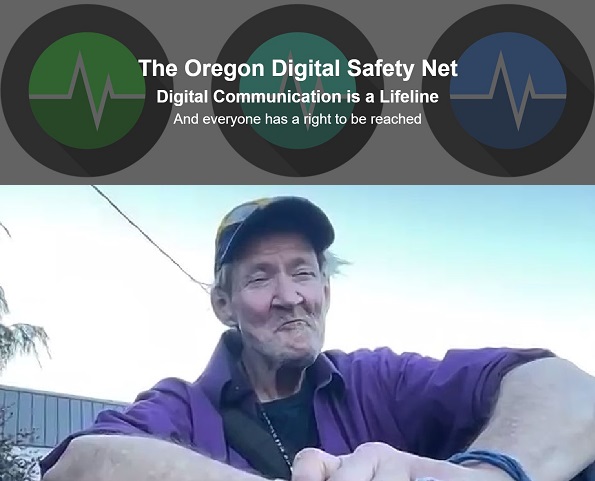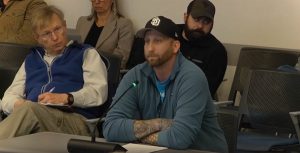Tech community tackles reconnecting with homeless after phone thefts
8 min read
In 2021, Oregon’s tech community came together to help the homeless. They formed a new startup venture, enlisting Eugene’s Sarah Koski as the development and partnership coordinator. Sarah introduced one of the project’s advisors, Will Shindler, an actor who helped open the Hult Center and is now back in Eugene.
Will Shindler (ORDSN advisor): I ended up in Eugene at Jefferson Park escaping some nasty business down in southern Oregon and one of the things that was nasty about it is that I’d had my phone stolen to the point that it created PTSD for me, post-traumatic stress, and the syndrome was so intense that when anybody would mention a lost phone or damaged phone or misplaced, I would start shaking.
[00:00:51] I have probably been through 12 phones in the last 18 months, and, what happens is that all my contacts are in that phone, so much of my life is in that phone, mobile banking, photographs, my life.
[00:01:09] And so to be homeless and not have a hard file at home, because everywhere’s your home, and to be constantly on the lookout for who’s going to take whatever it is they want, to have all that happening at the same time and to be frankly, pissed off and afraid and just be going through it all over again, it has brought about thoughts of suicide, thoughts of ‘I don’t care,’ which is not who I am. I’m a man of great care.
[00:01:42] And I feel very fortunate that I ran into Sarah because when she mentioned that she was going to do this, I just said, ‘I got some ideas,’ and, you know, I started taking photographs and asking people questions and I knew how I might be able to, you know, do something that would be helpful.
[00:02:01] Sarah Koski (Oregon Digital Safety Net): We did some street interviews and we heard from a gentleman, no one that either one of us knew, Will asked him, you know, ‘Do you have a phone?’ And you could just see the tears in his eyes. And he said, ‘I can’t keep a phone past three days.’ And it just was like his heart sank. And at that very moment, that’s when I realized we are doing what we’re doing for the right reasons.
[00:02:23] John Q: The Oregon Digital Safety Net would provide homeless persons with their own permanent phone number, permanent email address, and a place to securely store digital documents.
[00:02:34] Sarah Koski (Oregon Digital Safety Net): We had chatted about Oregon Digital Safety Net and the work that I was doing. And one of the things that I really wanted to amplify was lived experience and living experience advisors for this program, because we have such brilliant ideas coming out of Portland, and they’ve worked with a lot of the social service agencies, but there’s that component of who’s going to be the end user. And the end user is who we need to have as the strongest voice, so right now we have three advisors and Will is one of our advisors.
[00:03:10] I think one of the most inspiring things that I heard from Will is basically what his needs are, like, how tough it is to not have a phone and how often it is like when you lose the phone or phone gets stolen and what that means for your everyday life.
[00:03:26] Will Shindler (ORDSN advisor): I was staying down at the Highway 99 Dusk To Dawn and I dropped a Cricket phone in the port-a-potty, down in ‘the Blue Lagoon,’ they call it. I fished it out, but not soon enough. But the chemical in the water, it didn’t go well with the phone. And so then I went from that to another, and a crazy lady grabbed my phone right out of my hand one time at the bus stop, threw it on the highway. I had the phone about a week.
[00:03:53] I’ve lost a lot. Every time I got a new phone, I had to make contact with people, you know, and for me, it was very shameful that I had to say, ‘Well, you didn’t hear from me because I got, yeah, the phone thing again.’ And I knew some people that I would love to have continued that connection with, relationships. They go away like this song, ‘Nobody knows you when you’re down and out.’ And that’s very true, very true.
[00:04:23] Because I know we just ran into somebody earlier. And this guy, I could just see him trembling inside, talking about somebody stealing his phone. He’d fall asleep and I think he said there was a drug problem and he, you know, was falling asleep using the drug, he woke up, and everything was gone. Happened more than once. So I wanted to tell somebody like that: Those problems are gone.
[00:04:49] And they don’t have to worry, there’s a whole lot of things that the project is going to take care of. They’re going to have security, I’m sure they’re going to have technology that’s going to surpass a lot of what’s out there already, and that’s important.
[00:05:03] Sarah Koski: You keep a number. So even if you have to replace the phone, your number is permanent. We call it ‘evergreen.’ You have a permanent email and then we’re working on options for a scanned mail and some sort of digital vault for like Social Security cards and your ID.
[00:05:22] Everything will be in the cloud. It’s just making sure that you can prove your identity through, like, a thumbprint, for example. And you would just access that cloud server from your new phone. And now in the age of medical records and everything being online and forms having to be filled out online, you need a resume nowadays for a job and most jobs are posted online the implications to have that permanent is so substantial and the Oregon Digital Safety Net could be the tool that we use.
[00:05:55] So you have certain organizations, for example, maybe in Eugene, it would be White Bird or St. Vincent de Paul, and say you lose your phone or you get locked out. You would just go use your thumbprint and then get back in. You wouldn’t lose things anymore. You would have this sort of stability.
[00:06:13] Will Shindler (ORDSN advisor): Yeah, I’m not technologically suited for today’s technology, because I just think that way, I think that the other side of the brain does my work, but once I finally figured out that Google, I saved it onto the Google platform, then I was able to retrieve some things.
[00:06:32] Sarah Koski (ORDSN): Yeah. And that’s what we’re really, really hoping for is the connections, right? Like how Will was talking about, you don’t lose connections with family. You don’t lose connections with friends. Medical providers, if you have someone that you’re seeing for medical needs, mental health needs, Social Security if you’re a veteran and working with the VA office, even with employment, right?
[00:06:55] When I was working in the shelter, there was a gentleman, first time he had ever decided to seek out employment, got a job interview, and the next day, his phone was stolen. And the tragedy of that lost phone caused him to be in such a sad, dark place, that he never went and followed up with that job interview.
[00:07:22] And a lot of things that we take so, so much for granted in this digital era of connectivity is so vital and especially when it comes to finding a job or, even hearing from loved ones and to be able to have that connection with someone who may be a loved one, it’s really necessary for good stable mental health.
[00:07:46] And so that is our goal. It is one step in the right direction to stability, to peace and to allow people a way to keep life in order.
[00:07:59] John Q: Beyond permanent email and phone, the project is exploring ways to scan physical mail, and make that available online.
[00:08:07] Sarah Koski (ORDSN): So think about the fact that when someone does a front door assessment, they’re unhoused, they move into a shelter, front door assessment comes, depending on the score that’s determined by a national standard metric, you could be rapidly rehoused within six months or not get your Section 8 (housing) for five to eight years.
[00:08:31] And to be able to have that Section 8 mail scanned and accessible through this evergreen technology, even Social Security, or you have some sort of pending court case, or trying to get your children back, or tracking different things, to be able to see mail is such a benefit.
[00:08:54] Will Shindler (ORDSN advisor): And the United States Postal Service already has a scanning technology in place that you can tell what’s coming through the postal service in your direction, going to end up in your mailbox. So that’s very similar. (Yes.) It’s great.
[00:09:10] Sarah Koski (ORDSN): Yes. And then the digital vault. Again, when you think about the pandemic and the Social Security office was closed, how are you going to get a job if a sweep happens and you lose your Social Security card and the office is closed for six, seven months?
[00:09:26] And so if things are scanned and in this vault, your ID scanned in this vault, it’s going to save so much administrative time, not only just the time for our people and for the people using the digital safety net, but think about the economic implications of hospitals or doctors being able to reach people and the health of the community. That’s the biggest thing that we’re going for is keeping the community healthy, keeping the community employed, helping people make the right steps in the right direction.
[00:10:01] Will Shindler (ORDSN advisor): I shouldn’t have to go somewhere and prove that I’m Will Shindler all the time. I’m always me.
[00:10:06] I opened up the Hult Center. And it’s funny, this is, like, 40 years ago. And I was an actor for the Oregon Repertory Theater. The first time I worked for them was at the Eugene Hotel, and the second time we were out and about, and we ended up opening the Hult. We worked in the Soreng Theater. And I worked with Ed Ragozzino in the big stage. It was great fun. So Eugene’s been great to me. So all my fans, (if you’re still alive), I’m back.
[00:10:36] John Q: Will Shindler serves as an advisor for Sarah Koski and the Oregon Digital Safety Net. Learn more and support the project at ORDSN.org.






